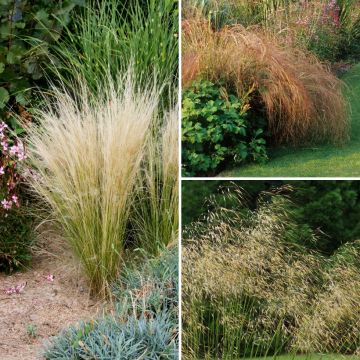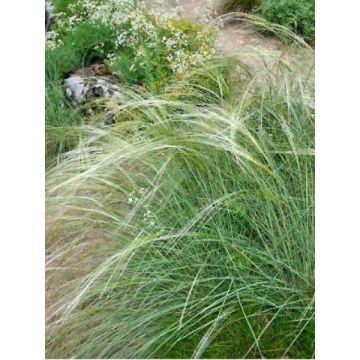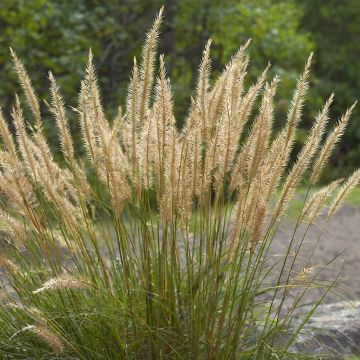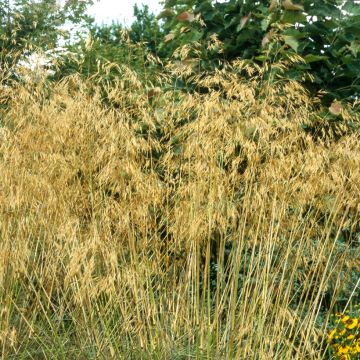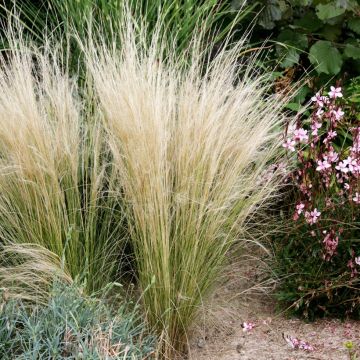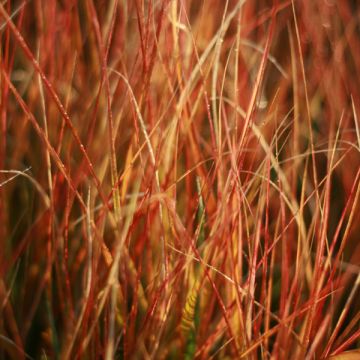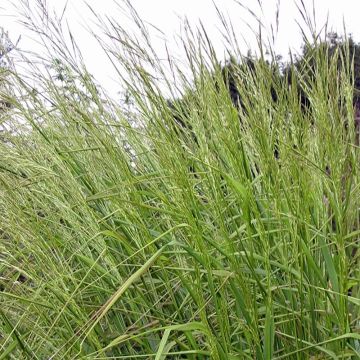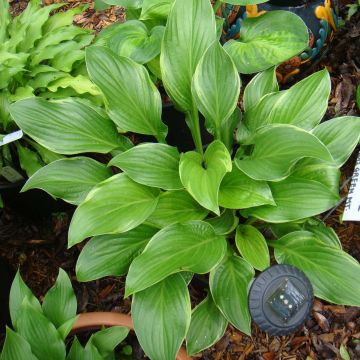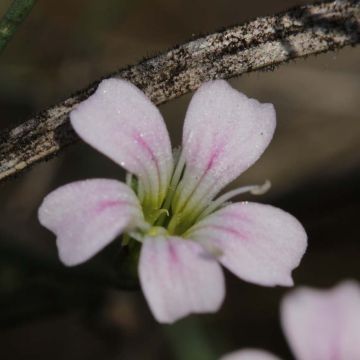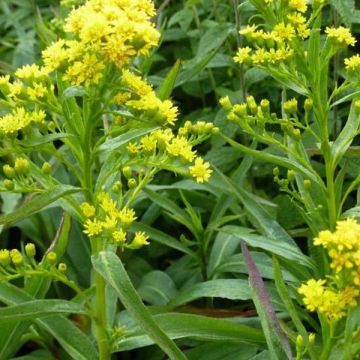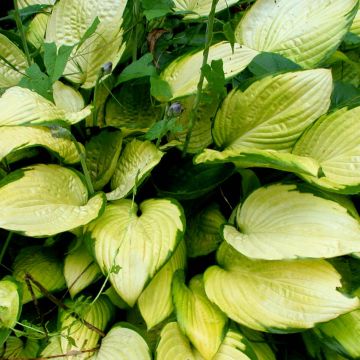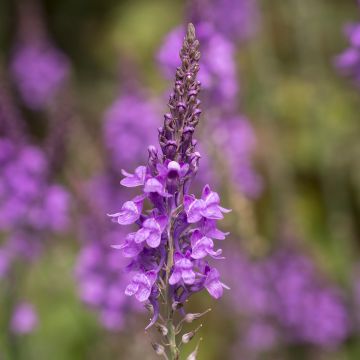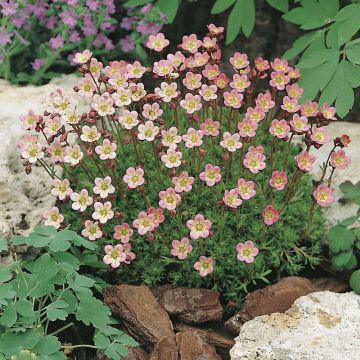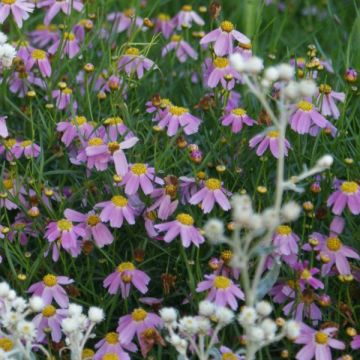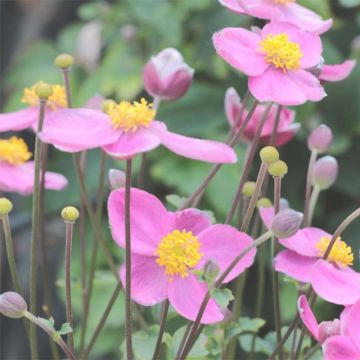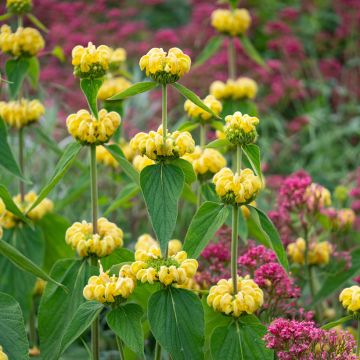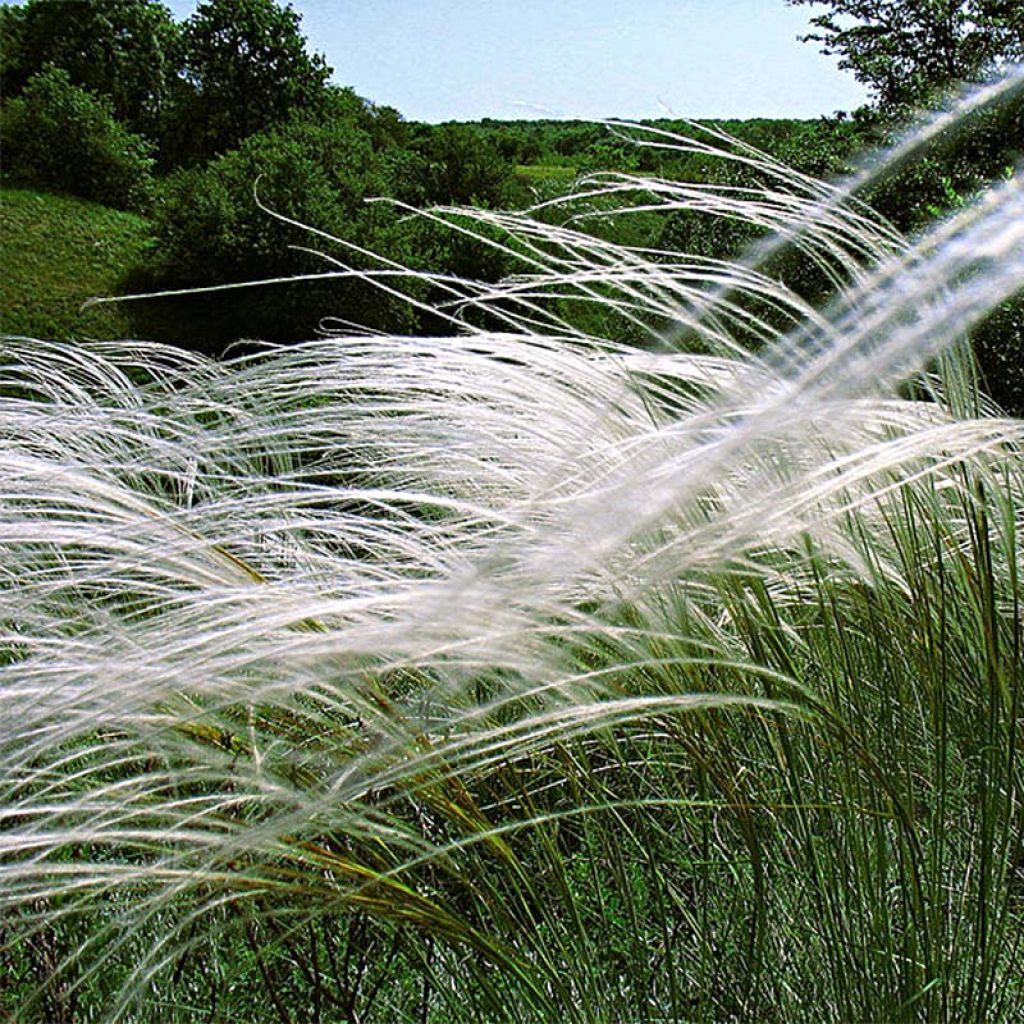

Stipa pulcherrima
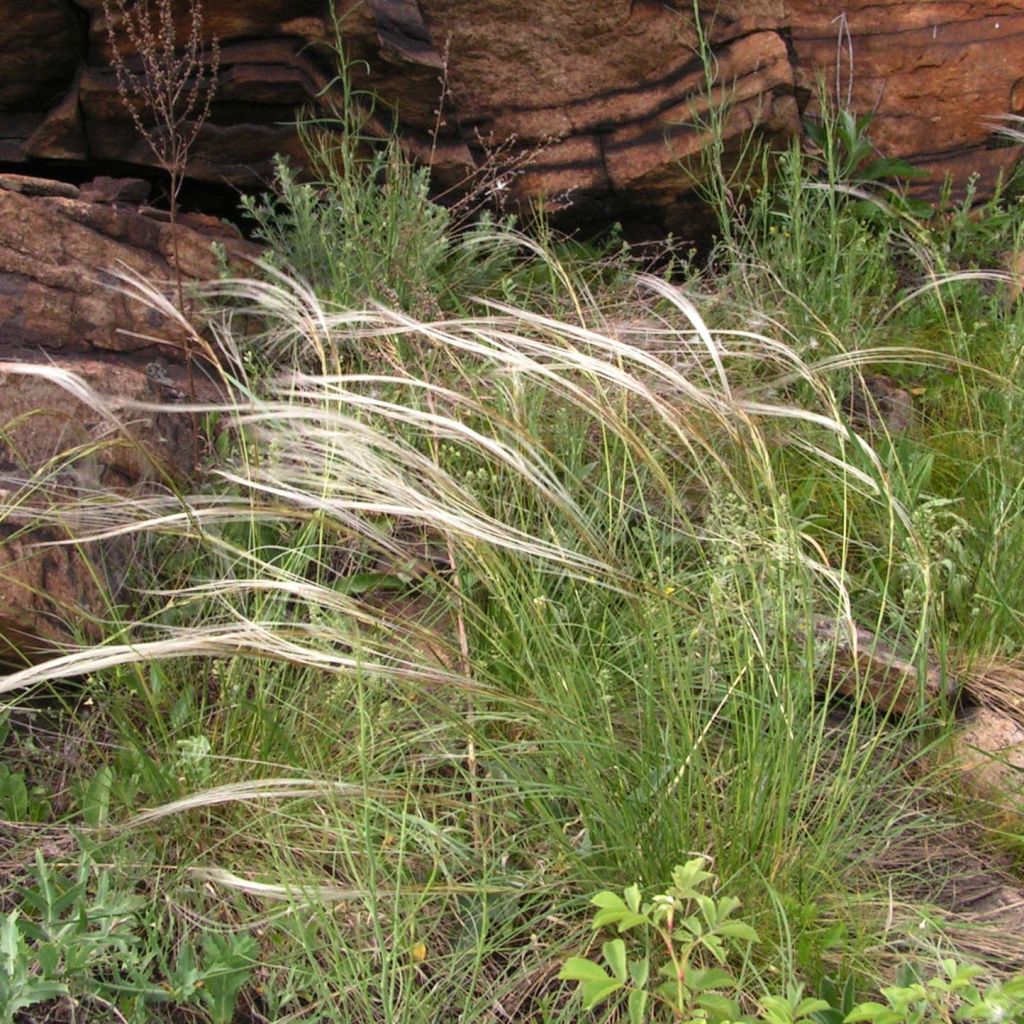

Stipa pulcherrima
Stipa pulcherrima
Stipa pulcherrima
Golden Feather Grass
The plants are quite small, but they are starting to green up as they have been kept indoors. Hopefully, they will continue to grow in the right direction.
lyliane, 23/01/2025
Why not try an alternative variety in stock?
View all →This plant carries a 12 months recovery warranty
More information
We guarantee the quality of our plants for a full growing cycle, and will replace at our expense any plant that fails to recover under normal climatic and planting conditions.
From €5.90 for pickup delivery and €6.90 for home delivery
Express home delivery from €8.90.
Does this plant fit my garden?
Set up your Plantfit profile →
Description
Stipa pulcherrima is also known as the Golden Feather Grass. From a fairly compact tuft of leaves emerges the flowering, in long, silver, languid spirals, as light as a breath. Filiform leaves and almost ethereal flowers play wonderfully with the wind and light, creating magnificent ephemeral scenes in the height of summer. Perfectly hardy and easy to grow in a sunny position with well-drained soil, this Stipa deserves to be planted more often, especially in dry, waterless gardens. It is a small grass of rare delicacy, which never becomes invasive but sometimes self-seeds in light soil. Comfortable in all gardens, from the most natural to the most contemporary, low maintenance, it is a perennial that fits the times.
The Stipa pulcherrima is a non-spreading herbaceous perennial plant belonging to the Poaceae family, like many grasses. Its origin is in the mountainous and arid regions of southern Europe and Asia Minor (Turkey, Iran and Armenia). This tufted plant, with a turf-like base, grows in a slightly arching clump composed of very thin linear leaves, smooth on the upper side, finely villous on the underside, of medium green colour. When mature, it will reach about 60cm (24in) in height when flowering and 40-45cm (16-18in) in width. Its growth is quite rapid, depending on the growing conditions. The foliage is evergreen. In summer, from June to late July depending on the climate, rigid culms emerge from the tuft of leaves, carrying inflorescences in the form of very long, slender, soft and silky spikes, with a very bright white-silver colour, turning golden in autumn. The seeds form in late summer on the spikes which retain their extraordinary beauty until winter. They are dispersed by the wind and ensure the species' perpetuity in gardens and in nature.
Hardy down to -15°C (5°F) in well-drained soil, Stipa pulcherrima is a perfect plant for dry gardens and areas where the soil is poor and rocky. This grass is appreciated for the indescribable poetry of its flowering, the extreme lightness of its hairy tufts, and its decorative aspect for a good part of the year. Animated by the slightest breeze, the plant is shaped by the wind, sublimated by the low evening light, softly rustling, almost musical. It accompanies flowering and light perennials such as linaria, penstemon, field daisies, Aster cordifolius, and scabious, as well as annual poppies and asphodels. Dark, green or purple foliage will highlight its long hairs that catch the light so well. Depending on the climate, you can choose, for example, Pittosporum tenuifolium 'Tom Thumb', Berberis thunbergii Atropurpurea, Sambucus Black Lace, or Physocarpus 'Diabolo' in moister soil. Plant it in a place where you can touch and contemplate it, along a path, on the edge of a terrace, or in a large pot, grouping several plants together.
Report an error about the product description
Stipa pulcherrima in pictures
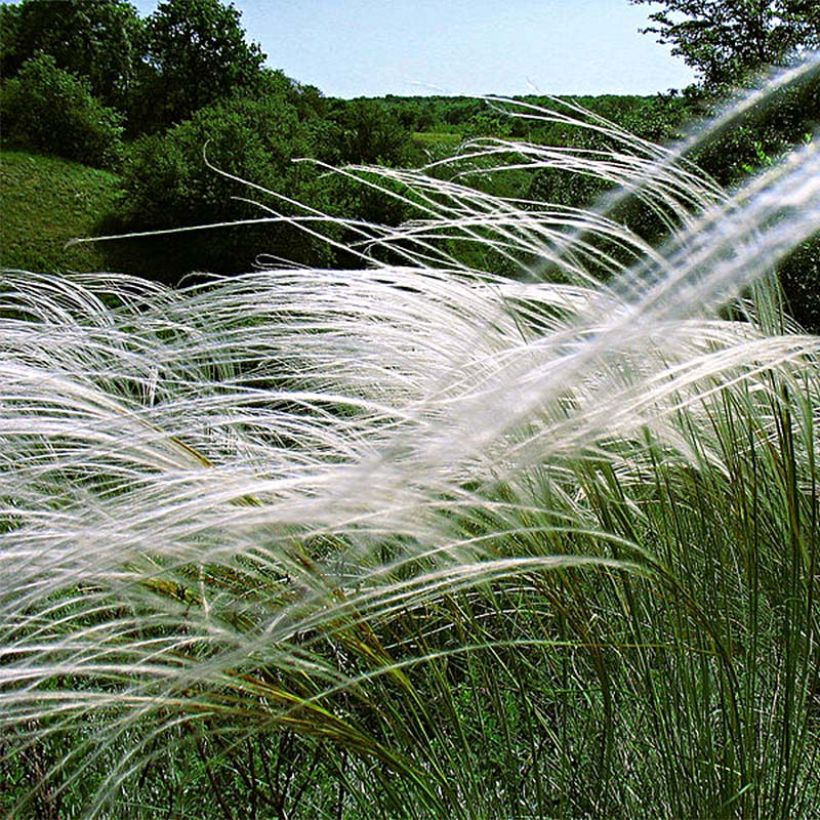

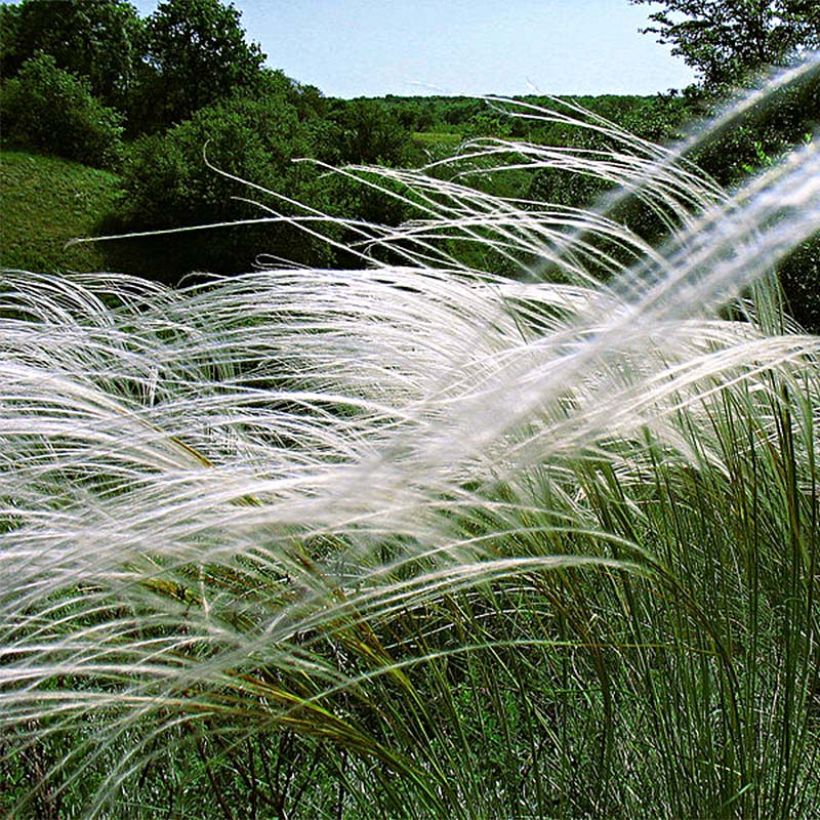

Flowering
Foliage
Plant habit
Botanical data
Stipa
pulcherrima
Poaceae
Golden Feather Grass
Mediterranean
Other Stipa
Planting and care
Plant Stipa pulcherrima in full sun or partial shade, in well-drained soil, even dry in summer, limestone and poor, and even stony or sandy. Hardy up to -15°C (5°F), it dislikes heavy and waterlogged soils in winter. A lovely plant that thrives easily, without any problems and without maintenance. Do not cut back the foliage in winter, simply comb it in late winter with your hand.
Planting period
Intended location
Care
-
, onOrder confirmed
Reply from on Promesse de fleurs
Summer flowering perennials
Haven't found what you were looking for?
Hardiness is the lowest winter temperature a plant can endure without suffering serious damage or even dying. However, hardiness is affected by location (a sheltered area, such as a patio), protection (winter cover) and soil type (hardiness is improved by well-drained soil).

Photo Sharing Terms & Conditions
In order to encourage gardeners to interact and share their experiences, Promesse de fleurs offers various media enabling content to be uploaded onto its Site - in particular via the ‘Photo sharing’ module.
The User agrees to refrain from:
- Posting any content that is illegal, prejudicial, insulting, racist, inciteful to hatred, revisionist, contrary to public decency, that infringes on privacy or on the privacy rights of third parties, in particular the publicity rights of persons and goods, intellectual property rights, or the right to privacy.
- Submitting content on behalf of a third party;
- Impersonate the identity of a third party and/or publish any personal information about a third party;
In general, the User undertakes to refrain from any unethical behaviour.
All Content (in particular text, comments, files, images, photos, videos, creative works, etc.), which may be subject to property or intellectual property rights, image or other private rights, shall remain the property of the User, subject to the limited rights granted by the terms of the licence granted by Promesse de fleurs as stated below. Users are at liberty to publish or not to publish such Content on the Site, notably via the ‘Photo Sharing’ facility, and accept that this Content shall be made public and freely accessible, notably on the Internet.
Users further acknowledge, undertake to have ,and guarantee that they hold all necessary rights and permissions to publish such material on the Site, in particular with regard to the legislation in force pertaining to any privacy, property, intellectual property, image, or contractual rights, or rights of any other nature. By publishing such Content on the Site, Users acknowledge accepting full liability as publishers of the Content within the meaning of the law, and grant Promesse de fleurs, free of charge, an inclusive, worldwide licence for the said Content for the entire duration of its publication, including all reproduction, representation, up/downloading, displaying, performing, transmission, and storage rights.
Users also grant permission for their name to be linked to the Content and accept that this link may not always be made available.
By engaging in posting material, Users consent to their Content becoming automatically accessible on the Internet, in particular on other sites and/or blogs and/or web pages of the Promesse de fleurs site, including in particular social pages and the Promesse de fleurs catalogue.
Users may secure the removal of entrusted content free of charge by issuing a simple request via our contact form.
The flowering period indicated on our website applies to countries and regions located in USDA zone 8 (France, the United Kingdom, Ireland, the Netherlands, etc.)
It will vary according to where you live:
- In zones 9 to 10 (Italy, Spain, Greece, etc.), flowering will occur about 2 to 4 weeks earlier.
- In zones 6 to 7 (Germany, Poland, Slovenia, and lower mountainous regions), flowering will be delayed by 2 to 3 weeks.
- In zone 5 (Central Europe, Scandinavia), blooming will be delayed by 3 to 5 weeks.
In temperate climates, pruning of spring-flowering shrubs (forsythia, spireas, etc.) should be done just after flowering.
Pruning of summer-flowering shrubs (Indian Lilac, Perovskia, etc.) can be done in winter or spring.
In cold regions as well as with frost-sensitive plants, avoid pruning too early when severe frosts may still occur.
The planting period indicated on our website applies to countries and regions located in USDA zone 8 (France, United Kingdom, Ireland, Netherlands).
It will vary according to where you live:
- In Mediterranean zones (Marseille, Madrid, Milan, etc.), autumn and winter are the best planting periods.
- In continental zones (Strasbourg, Munich, Vienna, etc.), delay planting by 2 to 3 weeks in spring and bring it forward by 2 to 4 weeks in autumn.
- In mountainous regions (the Alps, Pyrenees, Carpathians, etc.), it is best to plant in late spring (May-June) or late summer (August-September).
The harvesting period indicated on our website applies to countries and regions in USDA zone 8 (France, England, Ireland, the Netherlands).
In colder areas (Scandinavia, Poland, Austria...) fruit and vegetable harvests are likely to be delayed by 3-4 weeks.
In warmer areas (Italy, Spain, Greece, etc.), harvesting will probably take place earlier, depending on weather conditions.
The sowing periods indicated on our website apply to countries and regions within USDA Zone 8 (France, UK, Ireland, Netherlands).
In colder areas (Scandinavia, Poland, Austria...), delay any outdoor sowing by 3-4 weeks, or sow under glass.
In warmer climes (Italy, Spain, Greece, etc.), bring outdoor sowing forward by a few weeks.

































